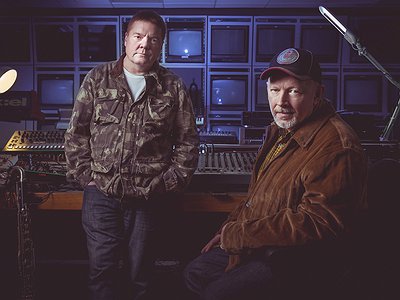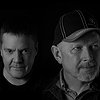Name: 808 State
Members: Andy Barker, Graham Massey
Interviewee: Graham Massey
Nationality: British
Occupation: Producers, Live Performers
Current Release: Transmission Suite. Order from the official 808 State store.
Recommendations: Selflessness (album) by John Coltrane.
Electric Eden - Unearthing Britain's Visionary Music (book) - Rob Young
If you enjoyed this interview with 808 State, check out their website and facebook page for recent updates and more music.
When did you start writing/producing music - and what or who were your early passions and influences? What what is about music and/or sound that drew you to it?
I was given a cassette tape recorder when I was 11. You start listening deeper at that age with one of those. I was taping everything! "Top Of The Pops" off the TV; making noise art with any instruments or pots and pans; junior field recordings; fake radio plays. I was drawn to bass when hearing music at the cinema. Audio equipment had so little bass back then, so it was profound when you came across it. The Shadows's Instrumentals during the intervals at the cinema or "Telstar" on a juke box around the corner from my dad’s office. The vibration factor was key.
I was also fascinated with atonal music as that was rare and mysterious. Like the end credits of Gerry Anderson's "UFO" and the scary monolith music from 2001. My brother had the album ‘Lux Aterna /Requiem’ by Ligeti. I swapped my reflector telescope for a guitar at 14, my dad made me an amp and fuzzbox. I bought an electric violin and joined a band at 16. We made the music of Gong. Punk Came along and we went off around the country doing free gigs and making wild noise as Danny & The Dressmakers. There was great dumb freedom!
We had a post punk band at the end of the 70s called Biting Tongues and made some records in actual studios. I so loved the transformative nature of studios, I would soon train as a sound engineer at SSR (School of Sound Recording) in its formative years in MCR.
For most artists, originality is first preceded by a phase of learning and, often, emulating others. What was this like for you? How would you describe your own development as an artist and the transition towards your own voice? What is the the relationship between copying, learning and your own creativity?
As a teenager we were copying some interesting groups. Gong as I said, everything in odd time signatures, jazz elements, electronic elements, all about colours and a lightness and humour. Hawkwind - again electronic but driving, distorted and at times atonal. When synths and drum machines became available and we were attracted to the acid house alienated wonky side of things, I guess we pushed harder in the weirder side of that sound, incorporating cross rhythms and ugly stacked chords. All the vocabulary of a UK record collection shoved into a US underground blueprint. Every new moment was probably debated at the time - sax in a house track, abstract guitar solos in a club track, Icelandic Indie singer in a club track … But those times were not so tied down with the weight of genre.
What were your main compositional- and production-challenges in the beginning and how have they changed over time?
We had methods of sequencing on the Roland synths and boxes. We had ways of driving the synths with the Atari computer but we still relied on tape to break out of the loop-like nature of sequencing. We would construct sections of tunes and splice them together by editing. It was not until the mid 90s that the computers we had could be powerful enough to do hard drive recording. Pro Tools was liberating and composing in the computer started to take over. Those early days of music computers were painful, crashes all the time … We lost a year's work once in the late 90s.
What was your first studio like? How and for what reasons has your set-up evolved over the years and what are currently some of the most important pieces of gear for you?
When we started out we only ever used other people’s studios. A day in a studio cost hundreds of £s, so you had to work fast and we wrote tracks and finished them often in a day. We owned some Roland 101s, a 303 and some drum machines, everything else we borrowed. We used to hire 10cc’s Mini Moog a lot until Trevor Horn gave us his. Once I had bought my own Atari and a Casio FZ Sampler, things became a lot more flexible. The floppy disc collection grew, picking up unwanted non midi keyboards was easy at the end of the 80s, those are still the basis of a great synth collection, Arp 2600, Mini Moog, Pro One, Juno, Jupiter 8 etc ... We still use all those 50 year old synths. Eventually we bought an 8-track tape set-up from another studio in Manchester and set up in an industrial estate in Longsight, Manchester. It was ok to write in but not to mix in. We always worked in pro studios back then. Cubase was our platform for many years. We always ran it alongside 2 inch 24 track tape.
[Read our feature on the Roland TB-303]
[Read our feature on the Juno 106]
How do you make use of technology? In terms of the feedback mechanism between technology and creativity, what do humans excel at, what do machines excel at?
I’m from a background of improvisation, getting in a room and making noise with other people is the most natural thing for me. Electronic music is still about that process but you can stop the clock and hone in on moments, polish things and find working solutions. We were the first generation of musicians that had that. Working with live musicians you become aware of the magic of the moment, synchronicity, telepathy.
Once you learn that, you can also learn to look for the magic in the birth of electronic music - machines have quirks and character, just don't flatten everything out into boring perfection.
Production tools, from instruments to complex software environments, contribute to the compositional process. How does this manifest itself in your work? Can you describe the co-authorship between yourself and your tools?
Our studio was an insane collection of synths, keyboards, vibraphones, guitars, a giant toy box. I want all the instruments available at the drop of a hat, because the moment of construction is quick. These days many tunes are cooking at the same time and you can do half an hour on this one and move over to something else for a bit. I take away sketches and sometimes they survive as whole tunes. Sometimes one element survives and the sprites visit later that month.
I had a project called Sisters Of Transistors - the whole premise was that we would only use vintage transistor organs. An organ quartet with me as the drummer. The limitations were hugely liberating for me as a writer. It dictated an ornate baroque-like music as melodies needed to be woven and stacked.
Bass-heavy music like the new 808 album needs to be structured with enough space, but in minimalism every riff counts - it had better be an ear worm! The melody factor starts living in the drums at times. Some of the 808 State drumapellas of the past are quite complete music by them selves.
Collaborations can take on many forms. What role do they play in your approach and what are your preferred ways of engaging with other creatives through, for example, file sharing, jamming or just talking about ideas?
For years when growing up, the act of listening to music was more often a very social act. People gathered with records they had bought and we listened and talked about emerging music. Even in the early days of 808 State that was still common practice. Martin owned a record shop and brought in new music all the time. We loved records from many genres
we were not just drawing from clubland. These days attachment to music has changed with the internet, the emotional investment is lighter.
So talking about music I feel is super important as part of the creative process. If you are working with someone who knows your music library, the process speeds up. I did a collaboration with Turkish musician / DJ Umut Caglar a couple of years back. On the one hand we had nothing in common growing up, but we both used a knowledge of jazz outsider music to do a solid electronic record together.
Could you take us through a day in your life, from a possible morning routine through to your work? Do you have a fixed schedule? How do music and other aspects of your life feed back into each other - do you separate them or instead try to make them blend seamlessly?
There is no routine. And I'm working from home, so almost permanently clashing with domestic issues. At the moment I'm answering a lot of press calls like this one, doing DJ mixes for various blogs, working with people on art work for a couple of upcoming retro releases. Having to wait in for a guy who is fixing the roof. Mixing audio from a gig we did in the summer in order that it can be used on the Internet. Doing shopping, a bit of guitar practise to relax, registering a film score I did for an art gallery in Iceland over the weekend. Organising a one-off gig with some of my mates in a pub in Yorkshire in November, Skype about running a trackathon at the University in Stockholm next month. Talking on Skype to our designer about posters for the new album campaign. Going out to dinner with my Australian nieces and my parents. For the past few years having a studio in the city center worked a lot better as a division, but the rents are going up all the time. It's a luxury too far at present.



